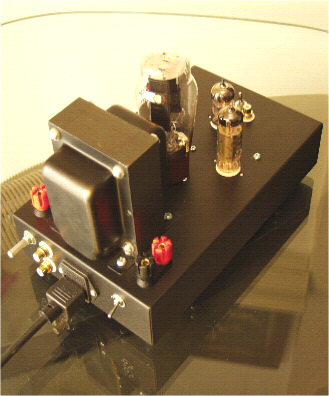|

Zen SE84C-S Review
Reviewed by: John,
an Audio Enthusiast
from
Baltimore, MD
Jan. 2003
Product Model Year:
2000
Summary:
I bought a Creek 4330 R (original model) and a Decware Zen
84C that had been upgraded at the factory to a Selectóboth at about the same
time. Both were used, purchased through audiogon, both dated from about the same
year, both were in good condition, and they were both in a similar price range,
so I feel they make a good comparison, though it is important to disclose that I
am comparing the original Creek (not the Mk2) and that both are used. As it
happens, the upgraded Zen was being auctioned by the maker (presumably a
trade-in), so I got the lifetime warranty with it. (Btw, the upgraded Zen
doesnít have all the features of a new Zen Select, such as front input jacks, so
I guess Iíd have to call it a hybrid-Select, but I think the sound would be the
same.) I listen mostly to classical music.
Advantages: The Creek is
undoubtedly a good amp and I am very happy with it for my second system. But
there is absolutely no question in my mind that the Decware is a lot better. The
Creek has some non-musical advantages, such as a remote control with mute and
volume control (though for what little it does control, it is a very pricey
addition). It is a very reliable solid-state amp, with a good sound, and (ihmo)
well worth the money. The Creek seems quite a solid unit, but the Zen, while
minimalist, is extremely solid and gives confidence that it probably will really
last the next 50 years. The most striking advantage of the Decware is its
soundstage. It really is possible to hear where the different instruments (even
just voice and piano) stand in relation to each other. This in turn adds both
detail and depth, allows you to hear how the components of a piece of music come
together, and makes the entire listening experience more ďaliveĒómore vital and
exciting. Even solo piano, I find, sounds better on the Decware: I find I can
hear the whole instrument, with its decays and resonance, better. As for voice,
this is another of the Zenís special strengths: it conveys voice as though the
singer were really in the room with you.
Disadvantages: By comparison,
the sound of the Creek is relatively garbled. Because the Zen separates
instruments so well, the Creek sounds (by comparison) as though it were
conveying a wall of soundóit doesnít have the same degree of depth and
separation. The Creek does sound beautiful, but the Decware has a vitality, a
sense of presence, and an ďalivenessĒ that the Creek lacks. There are some
disadvantages to the Zen, however. First, it is a tube amp, and the tubes do
have to be replaced. I personally hate having to fiddle with the music hardware
(Iím basically interested in the music), but the tubes are easy to find on the
web, theyíre cheap, and replacing them is as simple as pulling out the old ones
and pushing in the new onesódone in a few seconds. So I find I donít mind this
disadvantage at all. (For people interested in such things, the tubes offer the
opportunity of changing the sound some by replacing with different tubes.) More
serious is the low power of the Zen: this amp will not drive many speakers
adequately; it requires speakers with high efficiency. (There is a list of
recommended speakers on the Decware website.) Iím currently using some Klipsch
speakers (kg 4.5), which are not optimal. Maybe the best compliment I can give
the Zen is to say that I like it so much Iíve decided to shell out the money for
some new speakers that will be optimally matched to it, even though they
mightnít be a good match for other amplifiers: basically, Iíve decided the Zen
is good enough that Iím now happy to design my system around it. Iíve pretty
much decided to buy a pair of Parker 95 speakers ($650), which were designed
specifically for the Zen by a different company (which is also small and
web-basedóthereís a link to this and other speaker companies on Decwareís site,
which you can find through google or another search engine).
In sum, the
Creek is a really good mainstream product for the money, but the Zen is a truly
superb ďindieĒ amp, which brings you to a whole higher order of music
reproduction, if youíre willing to step out of the commercial mainstream. Buying
from Decware is a bit of a leap in the dark (itís a web-sales company), but the
companyís customer-support is terrific: itís easy to speak to the owner-designer
(Steve Deckert), who is a great guy and always gives extremely honest
adviceóeven to the point of steering you toward products (such as the Parker
speakers) that compete with his own.
Strengths:
excellent soundstage, involving and alive
Weaknesses:
low power creates problems of speaker matching |